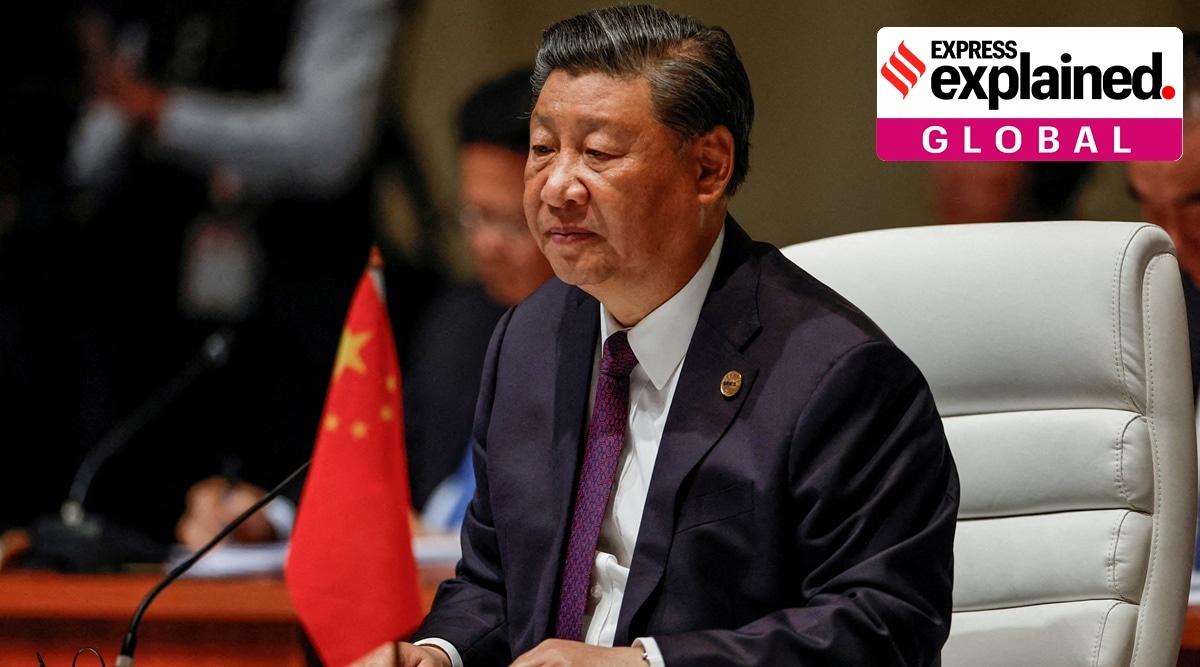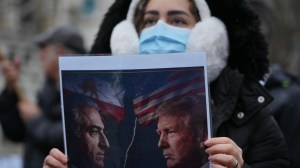Domestic woes, friction with the US, or to snub India? Behind Xi Jinping’s no-show at G20 summit
As speculations abound as to why Chinese President Xi is skipping a major global multilateral leader’s summit, Beijing's failure to come out with at least a congratulatory message to G20 host India puts Xi-style diplomacy in a poor light.
 Chinese President Xi Jinping attends the plenary session of the 2023 BRICS Summit at the Sandton Convention Centre in Johannesburg, South Africa on August 23, 2023. (Photo: GIANLUIGI GUERCIA/Pool via REUTERS/File Photo)
Chinese President Xi Jinping attends the plenary session of the 2023 BRICS Summit at the Sandton Convention Centre in Johannesburg, South Africa on August 23, 2023. (Photo: GIANLUIGI GUERCIA/Pool via REUTERS/File Photo) Typical of the way one party-ruled authoritarian China is governed, the Chinese foreign ministry issued a last-minute one-sentence notification on its website Monday (September 4) announcing that “Premier Li Qiang will represent China at the Sept. 9-10 gathering of G20 leaders.” More typically, when asked to explain the reason why President Xi Jinping would not be attending the summit, the ministry’s seasoned spokeswoman Mao Ning declined to answer.
With Beijing not revealing why Xi has preferred to be absent at the annual G20 Leaders’ Summit, analysts worldwide are offering conflicting interpretations for Xi skipping the event. Most plausible explanations include deliberately snubbing India – the “regional or local” power – avoiding one-to-one meetings with “insincere” US President Joe Biden, staying home to tackle too many uncertainties brought on by the ongoing economic slowdown, etc. and so on.
How has India responded to Xi’s absence?
In India, analysts are suggesting that Xi not joining the G20 summit is to deliberately “snub” India as “China is unwilling to confer influence on its southern neighbour that boasts one of the fastest growing one of the major economies while China slows.” But officially, New Delhi has tried to play down Beijing’s “snub.” India’s External Affairs Minister S Jaishankar responded by saying, “At the end of the day, countries are represented by whoever they have chosen to represent them. The levels of representation do not become the final determinant of the position of a country.”
In addition, a mere glance at the op-ed commentaries in the country’s elite English media shows three widely discussed factors: Xi is annoyed at India’s attempts to undermine China’s “leadership” role at recently concluded BRICS summit and India snubbing China at New Delhi’s SCO gathering two months ago; escalating border tensions along the Line of Actual Control (LAC) between India and China; and, India being actively drawn into the US-led Western anti-China “alliance” – specifically in the rapidly transforming security architecture in the Indo-Pacific.
How has the US reacted?
The media in the US and West has also hinted at Xi avoiding a face-to-face meeting with the US President during the summit in New Delhi as one of the more tangible factors. Recall here Xi’s finally agreeing to meet with Biden on the side-lines of the G20 Bali summit last November was after a great deal of initial reluctance.
A Chinese proverb goes that “hesitation only brings disaster.” This is precisely what happened to the US-China worsening relations after the Bali summit. The mutual acrimony and bitterness between the world’s two economic superpowers took a further ugly turn when Biden called Xi a dictator. Biden’s infamous remark was made a day after the US Secretary of State Antony Blinken concluded his much-hyped China visit on June 18 this year.
More importantly, according to experts, there might be internal political pressures that Xi has been forced to sit out of the G20 summit in New Delhi and avoid a meeting with Biden. Singapore-based political scientist Zhuang Jiaying told The New York Times: “Since all power is in the hands of Xi, his absence illustrates the uncertainty caused by opacity.”
Speaking of internal challenges and opacity in the face of mounting economic pressure by the US technological and investment policies of “de-sinicization,” (it’s a process of eliminating or reducing Chinese cultural elements, identity, or consciousness from a society or nation) in a rather unusual social media post-China’s Ministry of Security (MSS) declared Monday that the US must show more sincerity.
Interestingly, the MSS WeChat post was uploaded on the same day as the Chinese foreign ministry announced Xi would not be heading for the G20 summit – Monday. Though surprising that some scholars in China were quick to question the MSS post’s credentials to “cast doubt” over Xi’s diplomatic assignments, a report in the AP news agency described the security ministry as equivalent to the KGB in the erstwhile Soviet Union.
At the same time, there are reports that Biden expressed disappointment over Xi not attending the G20 summit and hoped to meet with the Chinese President at the APEC summit in San Francisco in the coming November. Casting doubt over Xi even travelling to San Francisco, AP cited the Chinese MSS post as saying, “To truly realise ‘from Bali to San Francisco,’ the United States must present sufficient sincerity.”
What are experts based in China saying?
On the other hand, experts and analysts in mainland China have been offering conflicting interpretations of Xi’s decision to not attend the G20 summit. Most Chinese experts and scholars have refrained from linking Xi’s skipping the summit in New Delhi with various domestic uncertainties and emphasised the external factors.
Whereas Professor Zhu Feng, dean of International Relations at Nanjing University, has told Hong Kong’s English daily the SCMP that he clearly sees the decision to dispatch Premier Li as to “snub India and it stems from New Delhi consistently hampering the bilateral relations in the recent years.”
Professor Wang Yiwei, a Beijing-based IR expert, in an interview with the international media, said he believes China’s decision to send Li, who is in charge of the country’s economic policy, to represent China at the G20 is reasonable. This is because the multilateral grouping is intended as a platform to discuss international economic and financial issues.”
While well-known foreign policy expert and professor at Beijing’s prestigious Renmin or People’s University, Shi Yinhong admits Xi’s absence is confirmation that given many G20 countries now have varying degrees of confrontation with China, Beijing is beginning to view G20 as more of a platform with shrinking value and with a limited international influence.
Is Xi committing a faux pas by not coming to the G20 summit?
Finally, all the above explanations – from snubbing India to avoiding meeting Biden to being held captive to tackling domestic challenges – do not capture the raison d’etre for Xi opting out of the summit in the manner in which India’s former Foreign Secretary Shyam Saran describes it as “unusual.” Although Saran, who has decades studying, analysing, and watching China’s foreign relations, has not elaborated on Xi’s “unusual” act, it is not difficult to understand what is implied is that this might be Xi’s major diplomatic faux pas. In diplomacy, absenteeism is seen not only as a failure but also as a disaster.
Recall what happened at the World Economic Forum in Davos in January 2017. A week before the US President-elect Donald Trump was to take office – Trump had already announced he wouldn’t be going to Davos – Xi delivered his maiden speech at the largest gathering of the world’s economic elite. Stunned by the communist Chinese leader’s pledge to protect globalisation, a former US administration official had observed: “Xi’s words made China look like a potential alternative global leader to the US.” The founder of the WEF Klaus Schwab declared while introducing Xi: “The world is looking at China.”
Further, as Trump began to distance the US from its allies, Beijing took the opportunity to take a more leading role in global affairs. Thanks to Trump, the next 12 months became remarkable for Xi. Steve Tsang, director of a London-based think tank, remarked: “The Trump administration was a godsend for the Communist Party of China.”
But a year later, the authoritarian style of the Chinese leader started to be reflected in China’s external dealings. As He Yinan, who teaches Chinese foreign policy at Lehigh University, observed in her interview with CNN in October 2020: “The behaviour of China under Xi Jinping really enraged many other countries. When Beijing wasn’t actively starting diplomatic rows with other countries, it often talked down to or intimidated them.”
Now, following his absence at the BRICS business forum in Johannesburg, his skipping the ASEAN summit in Jakarta held two days ago, and missing out at this weekend’s G20 in New Delhi, Xi is continuing to replicate his domestic authoritarian governance style externally as well. Some say this is a sign of the failure and decline of Xi-style diplomacy.
Explaining this authoritarian nature, Cornell University associate professor and China expert Jessica Chen Weiss recently said, “Though the aggressive [Chinese] behaviour has estranged diplomatic partners, the real target remains domestic. China’s system of government may not actually have ever been up to the challenge of becoming the world’s leading superpower, at least not in the model of the US.” Very “unusual.”
Hemant Adlakha is a professor of Chinese at the Jawaharlal Nehru University in New Delhi. He is also Vice-Chairperson and Honorary Fellow at the Institute of Chinese Studies (ICS), Delhi.
- 01
- 02
- 03
- 04
- 05






































